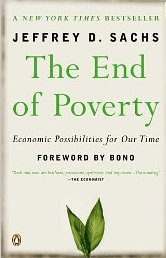
The End of Povertyby Jeffrey D. Sachs (Foreword by Bono)
How We Can Make it Happen in Our Lifetime.
This work is by an internationally recognised economist who has worked with and for governments (and UNO) at the highest level all over the world. It makes the bold, even revolutionary, claim that world poverty can be ended within the foreseeable future.
The author analyses the historical economic developments that have led to the gross inequality of wealth between countries, mainly the difference between the developed and the undeveloped areas. To begin with, he pins his faith on market-based capitalism. He proposes ways in which the rich countries can (and should) help the poorer ones to raise the living standards of their people.
His thinking is well summed up in his remark that he witnessed "... the conversion of moribund communist economies to dynamic market based economies..." He seems to admire Kennedy but fails to quote that president's public statement that "40 million Americans go to bed hungry every night". He correctly points out the remarkable increase in and spread of wealth in many countries since the 18th century, mainly based on our industrial revolution. However, he denies the contention that this was achieved by their exploitation of colonial peoples. He admits that this imperialist exploitation played its part but thinks it was only a minor one!
Sachs also praises Keynes but, again, ignores that economist's statement that: "Capitalism is the remarkable belief that the nastiest of men for the nastiest of reasons will somehow benefit the rest of us."
This is not the place for a detailed explanation of his recipe for abolishing world poverty; you will have to read this interesting, informative and remarkably detailed book yourself for that. Although he seems oblivious to the poverty in our own, prosperous world, it is a book which should be read by all interested in dealing with the gross obscenity which the terrible misery and poverty of billions of our fellow human beings represents.
The New York Times calls the book "a road map to a more prosperous and secure world."
